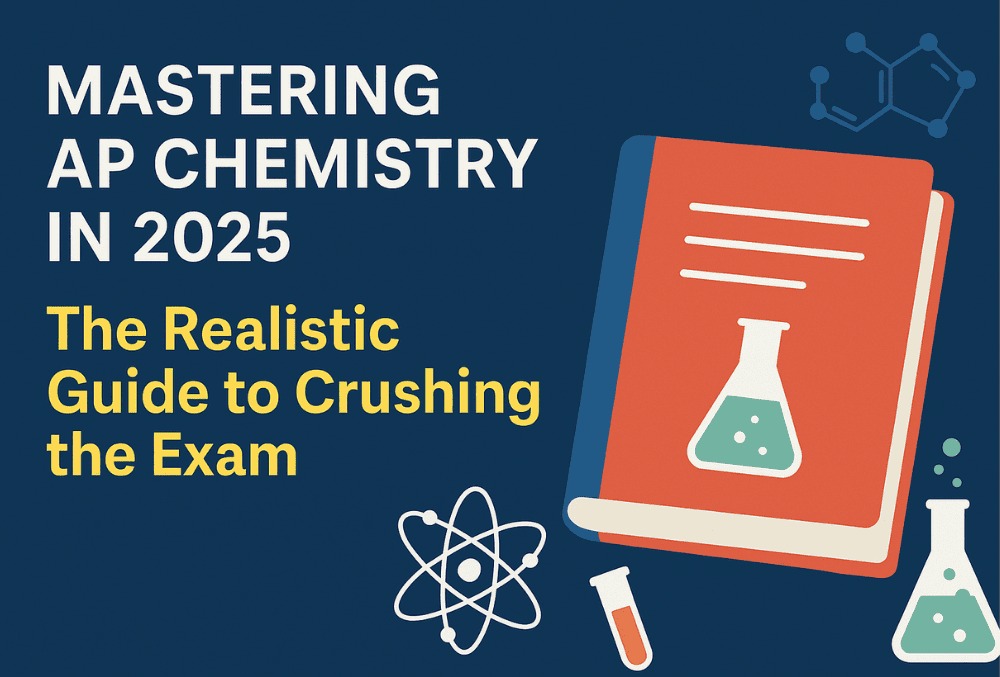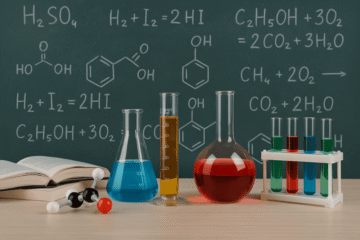AP Chemistry is one of the most respected and feared AP subjects in the U.S. Every year, thousands of high school students sign up for it with high hopes, only to be blindsided by reaction mechanisms, buffer systems, sig fig penalties, and long hours of lab writeups.
Whether you’re aiming to become a doctor, engineer, or just want college credit, AP Chemistry is a serious challenge but a beatable one.
If you’re reading this, you’re either planning to take it in 2025 or already deep in the trenches. Good news: this guide covers exactly what students across the U.S. are searching for, from study time to hardest units, comparisons with other APs, and how to actually make sense of all those formulas.
Why So Many Students Fear AP Chemistry (And Why You Shouldn’t)
Let’s address the elephant in the room.
Is AP Chemistry hard?
Yes. But here’s what makes it feel overwhelming:
It’s cumulative. Each unit builds on the last. If you don’t understand moles or stoichiometry, thermodynamics will hit like a truck.
It requires math skills. You’ll need to use logarithms, algebraic rearrangements, and scientific notation with ease.
It expects precision. From sig figs to unit conversions, even tiny mistakes can cost marks.
But here’s what no one tells you: it’s also one of the most logical subjects you’ll ever take. If you understand the rules, chemistry becomes like solving puzzles with atoms and energy.
When Should You Start Preparing for AP Chemistry?
Forget crash-studying two weeks before the exam. That doesn’t work here.
The best time to start preparing is as soon as you begin the course. But if you’ve already started late, don’t panic. You’ll need a tighter plan.
Here’s a realistic prep timeline:
August–November: Focus on deep understanding of the basics—atomic structure, periodicity, bonding.
December–February: Tackle more advanced topics like kinetics, equilibrium, thermodynamics.
March–April: Shift to timed practice. Learn how to structure free-response answers and improve your speed.
May (Last 2 weeks): Full-length mocks, last-minute concept brushing, error review.
If you’re self-studying, allocate at least 150–180 hours in total over 5 months. Break it down into 7–10 hours per week. You’ll thank yourself later.
What’s the Hardest Topic in AP Chemistry?
While difficulty is subjective, there’s near-universal agreement on the units that make students sweat:
1. Equilibrium
ICE tables. Kc and Kp. Le Chatelier’s Principle. This chapter is not just memorization—it’s logic, setup, and algebra combined.
2. Thermodynamics & Gibbs Free Energy
ΔG = ΔH – TΔS may seem simple, but understanding entropy, enthalpy, spontaneity, and their interconnections is where the real challenge lies.
3. Acid-Base Buffers & Titrations
Calculating pH of buffer solutions or interpreting titration curves involves more than plugging values. It requires pattern recognition and a solid grip on weak vs strong acid behavior.
4. Electrochemistry
Anodes vs cathodes. Galvanic vs electrolytic cells. Standard reduction potentials. One wrong sign and you’ll flip the answer.
Can You Self-Study AP Chemistry?
Yes, but with caution.
Self-studying this course is possible, but not advisable unless:
You already have a strong foundation in general chemistry
You’re willing to use multiple resources (not just one book)
You don’t mind simulating labs with videos or virtual platforms
Recommended self-study tools:
Book: Princeton Review or Zumdahl’s Chemistry
Videos: Bozeman Science, Tyler DeWitt
Practice: AP Classroom (via College Board), Albert.io, and UWorld for question banks
How to Study for AP Chem Without Losing Your Mind
1. Master the Fundamentals First
Before touching equilibrium or thermodynamics, get comfortable with:
Mole concept
Balancing equations
Limiting reagent problems
Lewis structures
Periodic trends
These are your building blocks.
2. Practice Over Perfection
Stop obsessing over getting everything right on the first try. Instead, practice consistently and correct your errors. The College Board rewards reasoning, not robotic answers.
3. Simulate Exam Conditions Weekly
Most students get wrecked not by knowledge gaps but by time pressure. Use a timer. Write FRQs. Track how long you take on each section.
What Score Do You Need to Pass?
3: Considered a passing score.
4–5: Required by most selective colleges for credit or placement.
Around 50–55% of students pass, but only 12–14% score a 5. It’s competitive, yes—but predictable if you prepare correctly.
Does AP Chemistry Use a Curve?
Absolutely. Like all AP exams, scores are curved to adjust for difficulty. A raw score of 60–70% can sometimes translate into a 5 depending on the year’s difficulty.
So even if you’re not hitting perfect scores in your mocks, don’t get discouraged. What matters is consistent progress and covering your weak areas.
Do Significant Figures Matter in the AP Chemistry Exam?
Yes, especially in the free-response section.
While the multiple-choice section is auto-graded, FRQs are evaluated by actual human readers trained by the College Board. They care about proper units, sig figs, and logical presentation.
Tip: Always round off your final answers to the appropriate sig figs. If you’re unsure, round to the least number of significant figures used in the data.
Is a Calculator Allowed on the Exam?
Yes—but only in Section II (FRQs).
The MCQ section must be done without one.
Make sure your calculator is approved. Most scientific and graphing calculators (like the TI-84) are accepted. But remember, knowing how to calculate isn’t enough—you need to know what to calculate.
Is AP Chemistry Easier Than Biology or Physics?
Depends on your learning style.
If you’re good with math and logic, Chemistry might feel easier than Biology.
If you prefer descriptive, diagram-heavy subjects, Biology may be your zone.
Physics (especially AP Physics 1 or C) is highly mathematical and theoretical.
Ask yourself: Do I like formulas or facts? Your answer should guide your expectations.
What If I Only Have Two Weeks to Study?
If you’re starting with zero prep and only have 2 weeks, you’re unlikely to master everything — but you can still aim to pass or earn a decent score.
Focus only on high-yield topics:
Stoichiometry
Thermochemistry
Equilibrium basics
Acid-base reactions
Redox and electrochemistry
Spend 6–8 hours daily solving FRQs, revising core concepts, and taking at least two full-length mock tests.
How to Score a 5 on the AP Chemistry Exam?
This is what top scorers do differently:
They review their errors obsessively. Every missed question is an opportunity.
They treat the AP Chemistry formula sheet like a tool, not a crutch.
They don’t waste time on overstudying theory; they practice applied questions instead.
They write clear, structured responses in FRQs—no rambling.
And most importantly, they don’t panic on exam day. Confidence comes from preparation, not perfection.
Conclusion: AP Chemistry Is Hard, But It’s Worth It
In a world where students are juggling 5+ APs, extracurriculars, and college apps, AP Chemistry stands out as both challenging and valuable. It teaches you how to think, not just memorize. And more than any other subject, it rewards consistency and clarity.
So whether you’re a future med student, an engineer in the making, or just someone aiming for a 4 or 5 to boost your GPA, know this:
You can conquer AP Chemistry in 2025. Not by being a genius, but by showing up prepared, persistent, and patient.




